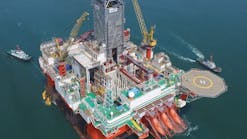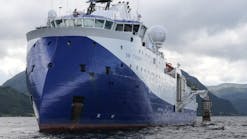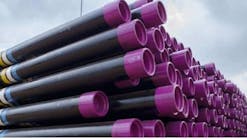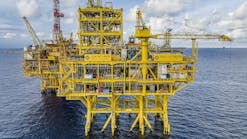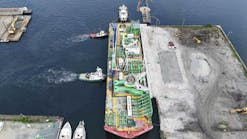Handling associated gas, finding and keeping qualified workers, and devel oping cost-saving technology for deep water exploration and production were among the global industry priorities emerging from a panel discussion at the Deep Offshore Technology (DOT'99) Conference, held recently in Stavanger, Norway.
Dr. Don Henery, Chairman of DOT'99, moderated a panel of industry experts including David Brookes, BP Amoco; Pierre Senequier, Elf; Mike Brady, Exxon; Luiz Rodolfo and Landim Machado, Petrobras; Matthias Bichsel, Shell; Egel Endreson, Statoil; Sverre Skogen, Aker Maritime; and Hugh O'Donnel, Saipem.
Panelists were asked what they saw as the challenges of deepwater and how these can be faced and resolved. The most important topic in deep water, certainly from a technical standpoint, was the disposition of natural gas associated with crude oil production. In many areas of the world, the flaring of gas is prohibited, or fined so heavily that it is not an economic solution. Deep water specialists need a solution that is cost effective.
A second major concern of the panel was the shortage of personnel, specifically those with expertise. Matthias Bichsel (Shell) said the shortage of people will restrict the speed of expansion into deepwater. He said oil companies need to leverage the employees they have in order to make the most of their skills.
Mike Brady (Exxon) said his company is constantly trying to lower its recovery costs to be competitive in a low-oil-price environment. The goal of Exxon is to recover oil at an average of $3/bbl. One area of focus, he pointed out, is reducing the time line from discovery to development in an effort to cut costs by increasing efficiency. He also said that improvements in organizations and learning-curve processes would improve decision-making and implementation at all levels.
Bottom line
Both Elf and Shell have placed emphasis on standardizing deepwater equipment, Shell in their subsea equipment design, and Elf in their call for sharing of equipment and second-hand sales of existing equipment.
These priorities, as well as others expressed in the scene setting discussion, point to a more pragmatic and bottom-line oriented deepwater market.
Oil and service companies are focusing their short-term attention on cutting costs and accelerating production. Pierre Senequier (Elf) pointed out that the oil business has a lower return on investment than many other industries. To attract investors, this has to change. In addition to sharing equipment among producers and contractors, he called for a more global approach to the busi ness, in an even effort to find greater efficiencies.
Even as he called for innovation in design, Egil Endresen (Statoil) pointed out that new equipment that affects a company's long-term operating costs has to be designed with an eye towards eventually lowering those costs.
In addition to the questions about finding and training new workers, Bichsel reiterated that the top priority on all these activities must be health, safety, and environmental issues. Not only are lapses in these areas very expensive, but they have the potential to halt exploration activities across the board in a particular region.
Shaping issues
Henery said the panel discussion, which served as a scene setting activity for the rest of the conference, is providing critical discussion of issues for new companies entering deepwater. The issues brought up by those with experience in deepwater will likely shape the direction of vendors and contractors in future research and development efforts.
Henery said he would like to see greater participation among the financial community in such events. While the global investor community is playing a more critical role in the development of this industry, Henery said many of the analysts do not understand the issues driving deepwater.
In addition to getting first hand information on where the industry is headed, the financial community could help guide those participating through the sometimes arduous process of securing funding for projects. Another group Henery says another group that should become more involved in industry conferences is regulatory author ities who have authority over deepwater acreage.
Ultra-deepwater
Henery said conference participants are pushing for more discussion on ultra-deepwater exploration and production. He said the concern was that although deepwater is a popular topic of discussion, the future lies in the ultra-deepwater fields where conventional technologies will have to yield to innovation.
While the majors are focusing on exploiting deepwater fields under the current market pressures, there has to be some thought given to the long-term future of the industry. Henery said this future clearly lies in ultra-deepwater.
One area of technology driving further deepwater activity by a variety of players is the growing use of subsea production, Henery stated. He said people are just starting to see the broad possibilities of subsea development and how these advances will impact the whole production chain.
Subsea and seabed systems will continue to spread to more fields as the technology becomes more standardized and the costs drop. Driven by the high cost of exploiting remote deepwater fields, subsea systems will play a key role in the future of the offshore industry, Henery said.
For the future, Henery said he sees more emphasis on front-end technology. While present discussion is focusing on the details of efficiently exploring and producing in deepwater, there will be more emphasis on ultra-deep exploration and development technology in the future.
More discussion needed
He said the need for industry experts will grow in step with the expansion of deepwater and ultra-deepwater exploration and production. The days of "playing cards close to the chest" are over as the majors and the service companies come to realize that it is more efficient to "lay their cards on the table" and participate in frank discussions that identify critical issues. And further, to send a call out to the industry for solutions that will make deepwater activities more efficient and ultra-deepwater activities more practical.
"This scene setting is what a lot of people are looking for to give them a feel for where they should be going in terms of where to invest research and development dollars and which technologies to back," Henery said.
Several of those involved spoke directly about the sharing of data and technology. Clearly this will be a key to advancing efficiency and safety in deepwater, Henery said.
